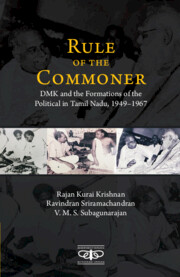11 - The Eruption
Published online by Cambridge University Press: 15 June 2022
Summary
In the months of January and February 1965, Tamil Naduwitnessed the eruption of mass protest and violencethat shocked almost all political actors in itsintensity and scale. The protests carried severalfeatures of subaltern uprisings such as lack ofcentral directives, spontaneity of action, role ofrumors, destructive and homicidal violence, staterepression, and finally, unverifiability of theprecise nature of events in many places whereseveral lives were lost. Though the Dravida MunnetraKazhagam (DMK) had spearheaded anti-Hindi movementsuntil the moment of eruption, it was the studentswho took the lead in “direct action,” which thenpropelled mass action in many places, the scale ofwhich is still a matter of oral histories and “folk”narratives. A perusal of the events between January25 and March 15, 1965, most particularly the threecataclysmic days between February 10 and 12, wouldscarcely leave anyone in doubt that these daystransformed Tamil politics forever. The party, as anorganization, was not directly involved in the wavesof spontaneous agitations in most places, eventhough students and activists belonging to the partyjoined the “public” in action. However, the eventswere bracketed by the DMK's sustained opposition tothe imposition of Hindi as well as a demand forDravidian political independence from its inceptionand its subsequent gain of popular support in theelectoral arena. It was as though the DMK wasairlifted in the most difficult part of its climb topower by the event of anti-Hindi uprising of 1965,as we will have occasion to analyze in detail in thesubsequent chapter on electoral participation.
In what follows in this chapter, we need to focus onmaking sense of the scale and spread of the uprisingwithin a span of a month, though a short-lived one.Before we narrate and analyze the event itself, weneed to gather the larger historical context inwhich it happened. We shall do so under threerubrics: the constitutive roles of the elite and thesubaltern in the linguistic public sphere, theconstitutional conundrum of designating the nationalor sole official language, and the Damocles sword ofofficial language implementation that theConstituent Assembly left hanging on the Indianrepublic.
- Type
- Chapter
- Information
- Rule of the CommonerDMK and Formations of the Political in Tamil Nadu, 1949–1967, pp. 217 - 238Publisher: Cambridge University PressPrint publication year: 2022



